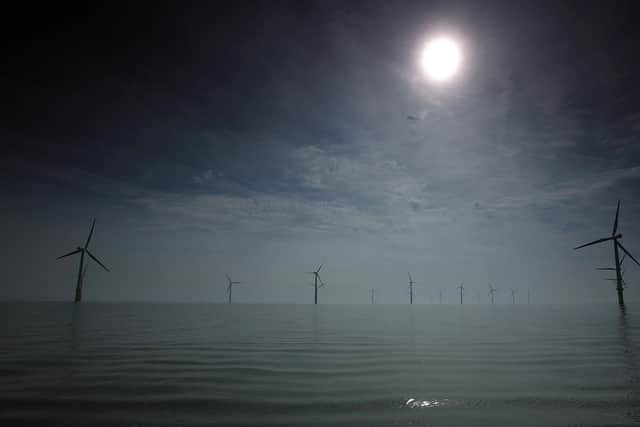Offshore wind: Sunak's failed auction reveals the folly of relying on market forces – Brian Wilson
Even if he wanted to, Rishi Sunak would not be in a strong position to lecture India or anyone else on routes to the energy transition. Indeed, he might be able to offer very up-to-date advice on how not to go about it. Relying on market incentives to deliver the replacement of fossil fuels with renewable energy, he might tell his G20 colleagues, is a fool’s errand. If the state wants to deliver an outcome of such historic importance, then it must be able to control the process, rather than cross its fingers.
We can safely assume Mr Sunak will not be minded to deliver any such message. For those of us at home, however, it is difficult to overstate the potential implications of yesterday’s confirmation that not a single fixed or floating offshore wind project has secured, or even applied for, funding under the UK Government’s Contracts for Difference (CfD) scheme.
Advertisement
Hide AdAdvertisement
Hide AdThis is a Dutch auction in which developers bid against each other to secure the lowest level of subsidy, while government also sets an upper cap. This time the cap, never mind the Dutch bit below, was too low to attract any interest. A new definition of net zero.


The signal this sends is dangerously negative, not just for energy but also industry. There are no projects without developers and no supply chain without projects. Fresh doubt has been cast on investment, both inward and domestic. There will be question marks over new infrastructure without the certainty of vast windfarms to utilise it.
Even by current expectations of government, it is astonishing this has been allowed to happen. Overwhelmingly, the UK’s ambitions for renewable energy by 2030 depend on offshore and floating wind. That is a very short delivery span – yet this sucker punch to the credibility of the whole enterprise has been walked straight into.
The problem with the CfD system, which the coalition government introduced in 2014, is that it over-values cheapness. In the short-term, this worked well as developers bid keenly to find the subsidy level they actually needed to make a project happen and get a decent return. The mistake was to think it could continue indefinitely on the same trajectory.
Yesterday’s non-auction sent a different message. Half the world is now trying to develop large-scale offshore wind. There are other options for multinational companies. And, by the way, costs have risen massively, partly because of that competition, since the last CfD round. So laps of honour by Tory ministers for finding a market mechanism which drove costs down were premature.
What happens next? Losing one year between now and 2030 may be considered careless but if the same lack of appetite persists in 12 months’ time, the implications will be startling. By then, of course, there should be a change of government and, as in many respects, Labour must be ready with solutions which will get the transition back on track.
This should involve not just replacing CfD but also questioning the whole basis of decision-making in what is supposed to be a mission of global significance – our part in the transition from fossil fuels to renewables. Yesterday’s debacle confirms the dangers of the state sub-contracting that responsibility to market forces plus a regulator.
I make no apology for harking back to the past because the past delivered outcomes we depend on today. For example, in the midst of the Second World War, government – with Churchill’s personal backing – committed an astonishing £1.12 billion in today’s money to the new North of Scotland Hydro Electric Board and its great schemes. Therefore it happened, which would be impossible today.
Advertisement
Hide AdAdvertisement
Hide AdThe grid and the power generators, including nuclear stations which served Scotland so well, were products of public policy and implementation; they were not beholden for their delivery to contrived market mechanisms or approval from any regulator. That is what gave us an energy system which maintained security of supply at affordable prices for previous generations.
I am not starry-eyed enough to expect that system to return. However, if the transition to renewable energy and achievement of net-zero targets are inescapable imperatives, then the state must have the power to make them happen – rather than relying on decisions by third parties over which, as we saw yesterday, it has no ultimate control.
Labour’s commitment to create a state energy company, GB Energy, is a step in the right direction and its powers must be commensurate with the challenge – which means guaranteeing outcomes rather than hoping for them, just as Cruachan, Longannet and Hunterston were not wished for by the state but determined by it. That is the true test of government.
Meanwhile, we live in the world as it is rather than we might wish it to be. I was speaking at Offshore Europe in Aberdeen this week and applied my usual advance test – a check with National Grid Live to see where our power was coming from at that moment. On a calm, sunny day, the answers were unsurprising – gas generation was supplying 38.4 per cent; solar 16.9, nuclear 15.7 and wind just 13.6.
Solar and wind are intermittent so security of supply depends on gas and nuclear. No matter how rapidly we advance offshore wind (which now faces new uncertainty), that reliance on gas will not change dramatically over the next decade and more. So long as that is the case, it makes no sense to run down our own production capacity rather than use its expertise as a bridge to the transition.
Except on the fringes of single-issue zealotry, these should not be difficult propositions to unite around. The real challenge is not to close down what exists but to deliver what is required to replace it.
Comments
Want to join the conversation? Please or to comment on this article.
